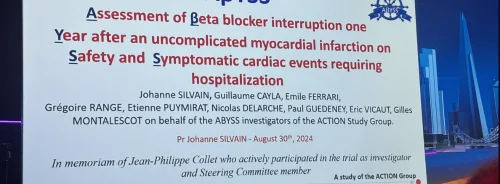Research presented at #ESCCongress2024 shows that tricuspid transcatheter edge-to-edge repair (T-TEER) significantly reduced the severity of secondary tricuspid regurgitation (TR) and improved quality of life after one year.
TR can occur due to intrinsic abnormalities of the tricuspid valve (primary TR), remodelling of the right heart chambers (secondary TR), or cardiac implantable electronic devices. It can lead to symptoms like fatigue and fluid build-up in the abdomen and lower limbs. It may also cause severe functional deficits, including reduced cardiac output and renal and liver impairment.
Patients with severe secondary TR often have poor quality of life and prognosis, and many are ineligible for surgery due to the associated risks. This study explores T-TEER as a new treatment option and evaluates this approach alongside optimal medical therapy.
The Tri.fr trial included patients with symptomatic, severe secondary TR who were stable for at least 30 days despite medical management and were ineligible for surgery. Participants were randomly assigned to receive either T-TEER in addition to optimal medical treatment or optimal medical treatment alone.
The primary endpoint was the Packer composite score, which combines the New York Heart Association (NYHA) class, patient global assessment (PGA), and major cardiovascular events, including all-cause mortality, cardiovascular mortality, tricuspid valve surgery, heart failure hospitalisations, and other hospitalisations. Secondary endpoints included the components of the primary composite score, severity of TR, and quality-of-life improvements assessed using the Kansas City Cardiomyopathy Questionnaire (KCCQ).
A total of 300 patients were recruited from 24 centres in France and Belgium. Of these, 40% had been hospitalised for heart failure within the year before enrolment, and 15% had a cardiac implantable electronic device.
The T-TEER group showed significantly higher rates of clinical composite endpoint improvement than the control group (74.1% vs. 40.6%). After one year, the severity of TR improved significantly in the T-TEER group compared to the control group.
Although the trial was not designed to detect statistically significant differences in hospitalisation and death rates, these were lower in the T-TEER group. Quality of life also improved significantly in the T-TEER group. Patient-reported outcomes were better in the T-TEER group and showed consistent improvement over time.
These findings demonstrate the benefits of T-TEER integrated into a comprehensive approach that includes guideline-directed medical management and follow-up for heart failure. A key takeaway from the Tri.fr trial is that rigorous multidisciplinary medical management resulted in low event rates, even among very ill patients with secondary TR. Combining T-TEER with optimal medical management also led to significant quality-of-life improvements.
Source and Image Credit: ESC Congress 2024






